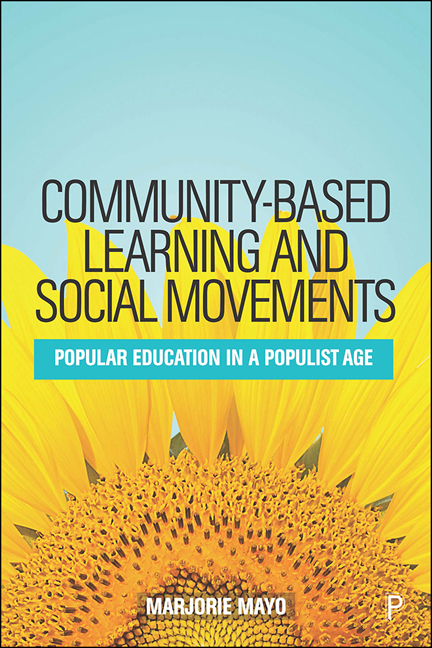Book contents
- Frontmatter
- Dedication
- Contents
- List of Figures
- Acknowledgements
- 1 Popular Education in a Populist Age
- 2 Popular Education and its Roots
- 3 Spaces and Places for Popular Education and Participatory Action Research
- 4 Principles and Practice
- 5 Sharing Understandings of Varying Histories and Cultures
- 6 Making Connections: Linking Issues and Struggles Across Space and Time
- 7 Power and Power Analysis
- 8 Community–University Partnerships
- 9 Taking Emotions into Account
- 10 Looking Backwards, looking Forwards
- References
- Index
4 - Principles and Practice
Published online by Cambridge University Press: 10 March 2021
- Frontmatter
- Dedication
- Contents
- List of Figures
- Acknowledgements
- 1 Popular Education in a Populist Age
- 2 Popular Education and its Roots
- 3 Spaces and Places for Popular Education and Participatory Action Research
- 4 Principles and Practice
- 5 Sharing Understandings of Varying Histories and Cultures
- 6 Making Connections: Linking Issues and Struggles Across Space and Time
- 7 Power and Power Analysis
- 8 Community–University Partnerships
- 9 Taking Emotions into Account
- 10 Looking Backwards, looking Forwards
- References
- Index
Summary
Previous chapters have referred to the principles that underpin popular education in differing economic, political, social and cultural contexts. This chapter summarises these before exploring some of the varying ways in which popular educators have been identifying with these principles and developing strategies to apply them in practice. These examples include the discussion of relatively formal approaches to learning as well as less formal creative practices along with the discussion of mixed approaches, learning programmes that have been offering a range of methods and tools.
Values and principles as these have been developed
Popular education has been defined as being popular but not populist (Crowther et al, 2005b), as previous chapters have already outlined – and subsequent chapters explore in further detail. There are inherent tensions and challenges here. Popular education may involve challenging people's beliefs, engaging in processes of dialogue to explore the underlying reasons for racist, sexist, xenophobic, anti- Semitic or Islamophobic views, for example.
Popular education has also been defined as being political and overtly critical of the status quo (Crowther et al, 2005b). Here too previous chapters have already outlined different ways of interpreting this aspect. Being overtly ‘political’ does not necessarily imply being ‘party political’. On the contrary, in fact. Political parties can and do engage in popular education of course, as Chapter 3 has illustrated. But this needs to be distinguished from the promotion of political propaganda. Popular education is committed to facilitating critical reflection, rather than necessarily following any particular political ‘line’. And this includes the commitment to facilitate critical reflections on the nature of power and how to challenge inequalities of power and resources, in whichever context or structure they impinge (including political parties’ own structures), along with challenging inequalities of power and resources within and between communities and social movements.
Finally popular education has been defined as being committed to progressive social change. This distinguishes it from political education and adult education more generally, where the focus may be on learning for a wider variety of purposes, including the purpose of learning for its own sake. Popular education is about learning in order to promote social justice agendas, facilitating critical understandings of the underlying causes of increasing inequalities and social deprivation, along with the causes of social conflicts and hate crimes.
- Type
- Chapter
- Information
- Community-based Learning and Social MovementsPopular Education in a Populist Age, pp. 57 - 76Publisher: Bristol University PressPrint publication year: 2020
- 1
- Cited by



